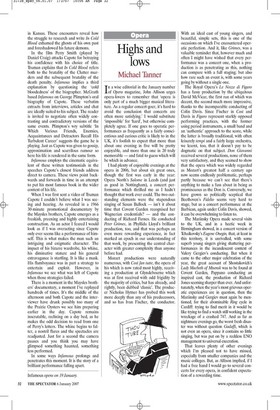Highs and lows
Michael Tanner In a wise editorial in the January number of Opera magazine, John Allison urges opera-lovers to remember that 'opera is only part of a much bigger musical literature. As a regular concert-goer, it's hard to avoid the conclusion that concerts are often more satisfying.' I would substitute 'impossible' for 'hard', but otherwise completely agree. If one goes to operatic performances as frequently as a fairly conscientious and curious critic is likely to in the UK, it's foolish to expect that more than about one evening in five will be pretty enjoyable, and more than one in 20 truly memorable — and fatal to guess which will be which in advance.
I had plenty of enjoyable evenings at the opera in 2006, but about six great ones, though the first was early in the year: Opera North's Salome in Leeds (and just as good in Nottingham), a concert performance which thrilled me as I hadn't thought that work ever could. The two outstanding elements were the stupendous singing of Susan Bullock — isn't it about time that Covent Garden recognised her Wagnerian credentials? — and the conducting of Richard Fames. He conducted Peter Grimes, in Phyllida Lloyd's brilliant production, too, and that was perhaps an even more rewarding experience, in fact marked an epoch in our understanding of that work, by presenting the central character with greater complexity than anyone before had.
Mozart productions were naturally numerous, with Cosi fan tutte, the opera of his which is now rated most highly, receiving a production at Glyndebourne which was at first received with odd frigidity by the majority of critics, but has already, and rightly, been dubbed 'classic'. The producer Nicholas Hytner has probed this work more deeply than any of his predecessors, and so has Ivan Fischer, the conductor.
With an ideal cast of young singers, and beautiful, simple sets, this is one of the occasions on which I've encountered operatic perfection. And it, like Grimes, was a valuable reminder that, however much and often I might have wished that every performance was a concert one, when a production is as penetrating as this, nothing can compare with a full staging; but also how rare such an event is, with some years going by without a single one.
The Royal Opera's Le Nozze di Figaro has a fussy production by the ubiquitous David McVicar, the first run of which was decent, the second much more impressive, thanks to the incomparable conducting of Colin Davis. Since Fischer in Cosi and Davis in Figaro represent starkly opposed performing practices, with the former using period instruments, a small band and an 'authentic' approach to the score, while the latter is broadly traditional, with often leisurely tempi and a fairly large orchestra, we learnt, too, that it doesn't pay to be dogmatic on that subject. Don Giovanni received several productions, none of them very satisfactory, and they seemed to show that the opera which was widely regarded as Mozart's greatest half a century ago now seems endlessly problematic, perhaps partly because we can't see that there's anything to make a fuss about in being as promiscuous as the Don is. Conversely, we have grown so politically sceptical that Beethoven's Fidelio seems very hard to stage, but as a concert performance at the Barbican, again under Cohn Davis, showed, it can be overwhelming to listen to.
The Mariinsky Opera made several visits to the UK, and in a hectic week in Birmingham showed, in a concert version of Tchaikovsky's Eugene Onegin, that, at least in this territory, it is unrivalled, with some superb young singers giving shattering performances in the incandescent context of Valery Gergiev's conducting. But when it came to the other major celebration of the year, the great account of Shostakovich's Lady Macbeth of Mtsensk was to be found at Covent Garden, Pappano conducting an inspired cast, the production of Richard Jones seeming sharper than ever. And unfortunately, when the year's most grievous operatic experiences are in question, then the Mariinsky and Gergiev must again be mentioned, for their abominable Ring cycle in Cardiff: trying to find merit in it would be like trying to find a watch still working in the wreckage of a crashed 747. And as far as nightmare evenings go, the worst fresh disaster was without question Gadaffi, which is not even an opera, since it contains so little singing, but was put on by a reckless ENO management to universal execration.
That leaves plenty of other evenings which I'm pleased not to have missed, especially from smaller companies and the music colleges. But, as Allison implied, if I had a free hand I would go to several concerts for every opera, in confident expectation of a rewarding time.




































 Previous page
Previous page